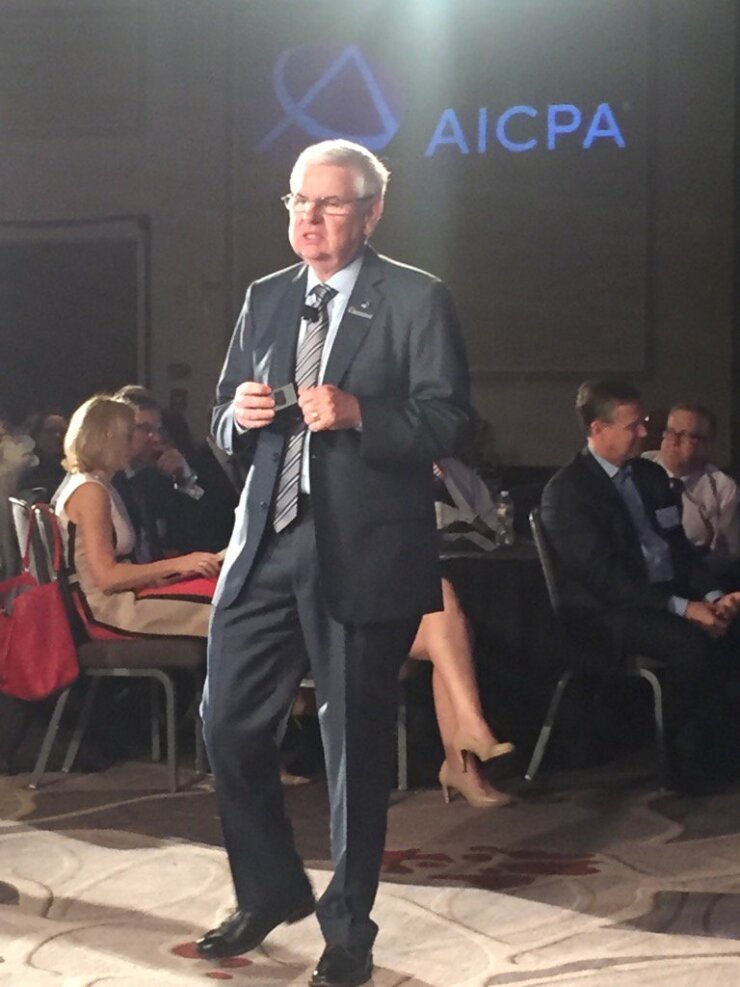American Institute of CPAs president and CEO Barry Melancon discussed the use of artificial intelligence, bots and other advanced technology, along with the future role of accountants, at the AICPA’s Spring Meeting of Council in Washington, D.C., on Monday.
“We are in excellent, capable hands,” said AICPA chairman Kimberly Ellison-Taylor in introducing Melancon. “As we work together collectively to move the profession forward, to ensure our relevance and vibrancy for the future, it gives me great comfort to have Barry at the helm.”
Before discussing technology, Melancon mentioned the AICPA’s new international association that it formed in partnership with the Chartered Institute of Management Accountants. “We’re well positioned as a profession, and as leaders all of you have a really critical role in how we can transform society and how we can lead that going forward,” he told the AICPA Council members.

He noted that with the new Association of International Certified Professional Accountants, the AICPA now has 33 offices in 23 countries. Melancon had mixed success in demonstrating how Amazon’s Alexa bot technology could be used by accountants. He tried to demonstrate Alexa’s translation skills, asking Alexa to say, “Welcome to this meeting in Washington, D.C.,” in Mandarin Chinese. However, Alexa replied, “Sorry, I’m having trouble accessing your translating skill now.” Alexa was successful in giving a description of the new Association of International Certified Professional Accountants, but was unable to say what the role of the AICPA’s new RIVIO financial information clearinghouse is.
Despite the technical glitches, Melancon sees a role for smart bots in the future in accounting. “Futurists tell us that virtually every home of means in the next year will have a device such as this that will interface with the internet in certain ways, and they actually tell us that any home of means by the end of 2018 will have a high likelihood of having a robot in their homes,” he said.
He pointed to the robot Rosie on the animated cartoon “The Jetsons” as an example of the kind of robot many Baby Boomers recall seeing on TV. “We will have that ability and we’ll be able to program our robot how we want him or her to interact with us in those particular environments,” said Melancon. “If you think about it, the notion of being able to learn skills and different facts is a very important aspect, and when the skills increase we can start to see where we can solve different types of questions for staff, clients and the like using these different types of machine learning capabilities. Our team has been working on building customizable machine learning skills to really be able to position some of this knowledge base for the profession. Alexa doesn’t automatically know these things. You have to go through a process of teaching a machine these particular aspects. The aspects then change because they learn from their own activity in that particular space.”
Melancon pointed to IBM’s Watson technology as another example of a machine learning process that can be leveraged by accountants. “IBM Watson in its infancy would have filled your hotel room,” he said. “Today it basically fills four pizza boxes, but the capabilities are almost unlimited, and its interaction is through setting up and teaching Watson to learn certain things and expand upon those capabilities. That is really where the world is evolving today. The machines get basic skills and then continue to build on those skills themselves, much like our brains do.”
He sees AI and bots assisting accountants with tasks such as data analytics for auditing. However, Melancon disagreed with billionaire entrepreneur Mark Cuban, star of the TV show “Shark Tank” and owner of the Dallas Mavericks, who predicted that accountants might become obsolete. Cuban recently told
Melancon disputed Cuban’s argument that advances in technology mean accounting isn’t a profession for the future. “I would argue that’s a very superficial comment,” he said. “That’s a comment from a person who really doesn’t understand what the profession is about and how we have been actually moving to the higher cognitive skills in management accounting, public accounting—however you want to define it, in advisory, auditing or accounting—for some time now. We are also embracing those changes.”
He pointed to how one of the Big Four firms today is using robots in its tax practice. “It’s not in theory, it’s being done,” said Melancon. “It’s estimated that there’s about 99 percent accuracy with the way it’s set up, with a productivity gain of about 40 percent, with the use of machine technology in their tax practices today.”
However, Melancon acknowledged some troubling studies, including a recent one by Accenture and Deloitte that predicted robotics would eliminate or automate up to 40 percent of basic accounting work by 2020. Even half of that amount would be staggering, but he believes that accountants will adapt to leverage the technology advances and make the most of them.
“The directional issue is undebatable,” said Melancon. “Every data point produces that type of outcome. Organizations producing blockchain capabilities are already in huge elements, which are going to drive even more changes from a technological perspective. We’ve always faced as a profession these stereotypes in the past, like the green eyeshades, but also the stereotype that we’re not adaptive. I don’t think that’s true whatsoever.”





